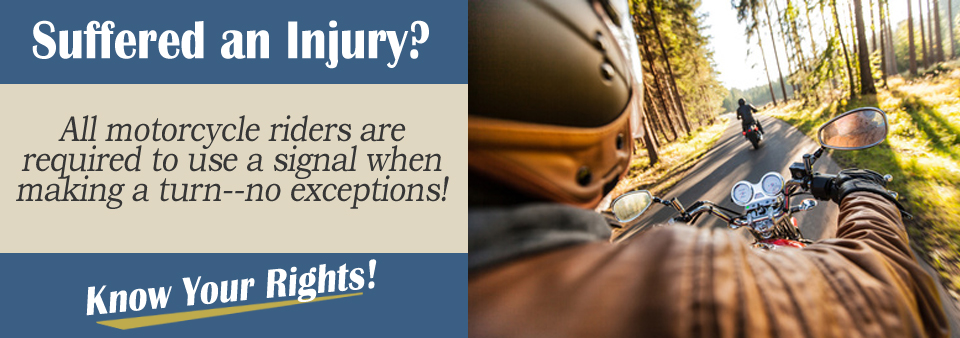If you are traveling down the road either riding a motorcycle or near motorcycles, you might be wondering if a motorcycle needs to make a turn signal like a car or truck would. According to traffic laws, motorcycles are required to be equipped with at least one headlight, one taillight, a brake light, a registration plate light, rear reflectors, and turn signal lights.
Older motorcycles, made before 1973, are not required to have turn signals because most of them were not equipped with them originally, but operators must use a hand signal when operating them. Just like any other motorized vehicle, a motorcycle operator must use a signal before turning or making a lane change.
Motorcycle Turn Signal Laws
When you are riding a motorcycle, you must adhere to the laws of the road just like any other motor vehicle. Bikers must use turn signals and give warning before changing lanes or turning onto another roadway. There are specific laws that apply to motorcycles and their lighting.
Driving laws vary from one state to the next, but in most states, must be equipped with at least one – but no more than three – headlights. Bikes must have a taillight, turn signal lights, a brake light, rear reflectors, and a registration plate light so the license plate is visible.
As an example, in Texas, motorcycles are not required to have turn signals. They aren’t a pass or a fail item for a vehicle inspection, so it doesn’t matter if they are working or not. It is, however, illegal turn without properly signaling in any state. That means even if you must use a hand signal.
You need to make sure you are familiar with the laws in the state where you are riding a motorcycle. You want to make sure you are adhering to the traffic laws, so you don’t face any penalties or increase your chances of an accident. You don’t want to end up in a sticky situation that could have been avoided.
Other factors could have come into play that caused the accident, but the failure to signal could have been the last straw. If your attorney can prove that the failure to signal was either the cause or a major contributor to the crash, then you have a foundation for a personal injury claim.
What To Do If A Motorcycle Didn’t Use Its Turn Signal
If you have been in a crash with a motorcycle that didn’t use its turn signal, you will need to prove that the biker failed to use the signal. The biker might not be willing to admit that he or she failed to signal.
In that case, you will look for supporting evidence, such as witnesses who saw the accident or video footage from a surveillance camera or dash camera that reveal that a turn signal wasn’t being used.
Anytime there is an accident you should always call the police. The officer who responds will complete an accident report. During his or her investigation, they will try to determine what caused the crash and will ask if a turn signal was used. The officer will also get statements from any witnesses and check to see if there is other supporting evidence available.
You should enlist the help of a personal injury attorney who handles auto accident cases in your state. Your attorney will review the details of your case and will conduct an in-depth investigation into the accident. Your lawyer will work to figure out all the contributing causes to the crash.
If you allege that the crash was caused by a motorcycle failing to use a turn signal, the lawyer will work to prove that was what happened. Your attorney will know the process for getting access to any surveillance cameras or traffic cameras that may have caught the accident on video.
There is a statute of limitations, or a time limit, for pursuing a personal injury claim after an auto accident. If you wait until the deadline has passed, then you cannot pursue a personal injury claim to recover compensation for the damages that you suffered in the accident.
If you have been in an accident with a motorcycle that didn’t use a turn signal, you should talk with a lawyer as soon as possible. With the help of an attorney, you will be able to gather supporting documentation and evidence and work to negotiate a settlement with the insurance company.
The Responsibility To Signal
If the motorcycle doesn’t have operating signals, the person operating the bike has the responsibility to hand signal. That way, other drivers will know where the bike is heading and how to react. When a driver can predict direction of another vehicle, then he or she can respond properly and not move in the same direction and it can help avoid a collision.
Drivers may fail to look for hand signals and if a hand signal goes unnoticed, then the driver who ignores it is to blame. Every driver has a duty or a responsibility to protect others from harm by being attentive and adhering to traffic laws while behind the wheel.
How Negligence Comes into Play
As the operator of a vehicle, you have a responsibility to obey traffic laws. That means that you must obey the speed limit, obey traffic lights and signs, and exercise due care to protect others from harm. If any of those actions are ignored and an accident results, the driver or operator of the vehicle is responsible for the damages that result. When negligence has been proven, you have a successful personal injury claim with documentation.
Damages That Might Result
A variety of damages might result from an accident caused by a motorcycle not giving a turn signal. Common damages are medical expenses, future medical expenses, lost wages, future loss of earnings, mental trauma, pain and suffering, property damages, loss of consortium, permanent scarring, loss of enjoyment of life, and more. You need to maintain documentation to support your claim, such as medical records, medical bills, proof of missed work and lost wages, damage repair estimates, and photos of any damages and injuries.

What to Do in Such Situations
If your motorcycle is equipped with a working signal, it might be difficult to prove that the motorcycle rider failed to use the signal. In those situations, it becomes one person’s word against another unless there is strong evidence that suggests the signal was not used, such as a dash cam or some business camera that caught the entire incident or the statements of eyewitnesses who had no connection to either party involved in the crash.
When there is an accident, always call the police to complete an accident report. They will investigate and try to determine what caused the crash. Often, they can find out if a signal was not used when it should have been. That accident report might show fault, which could be a big help to your personal injury claim as well.
Accidents When Turn Signals Aren’t Used
Failure to use a turn signal can lead to accidents. If you don’t use a turn signal and a crash results, you could be considered negligent. When all four elements of negligence are proven, then there is liability. When you fail to signal, your chance of direction is unpredictable, and others don’t know where you are heading.
If you turn without signaling, you could be hit by a car that is passing you. This could result in a serious T-bone or side impact crash. If you don’t signal, then the driver behind you doesn’t know you are going to make a turn, so you may be rear-ended.
Other vehicles may change lanes as you do, which could cause a collision.
Any of these accidents could lead to expensive property damages as well as life-altering injuries. These damages could add up quickly and put your entire family in a financial bind because of your mounting medical bills and lost wages.
Depending on the state in which your accident took place, you may be able to pursue a personal injury claim even if you are partly to blame. Other states will not allow you to pursue a claim even if you are less than 50 percent to blame for the accident.
Consult with A Personal Injury Attorney
If you were involved in a crash where a motorcycle didn’t use its turn signal, you must consult with a personal injury lawyer. Your attorney will investigate your crash, determine what went wrong and why, and then help you decide the best way to proceed with your claim. Complete the Free Case Evaluation Form today so you can get your claim on the right track!
